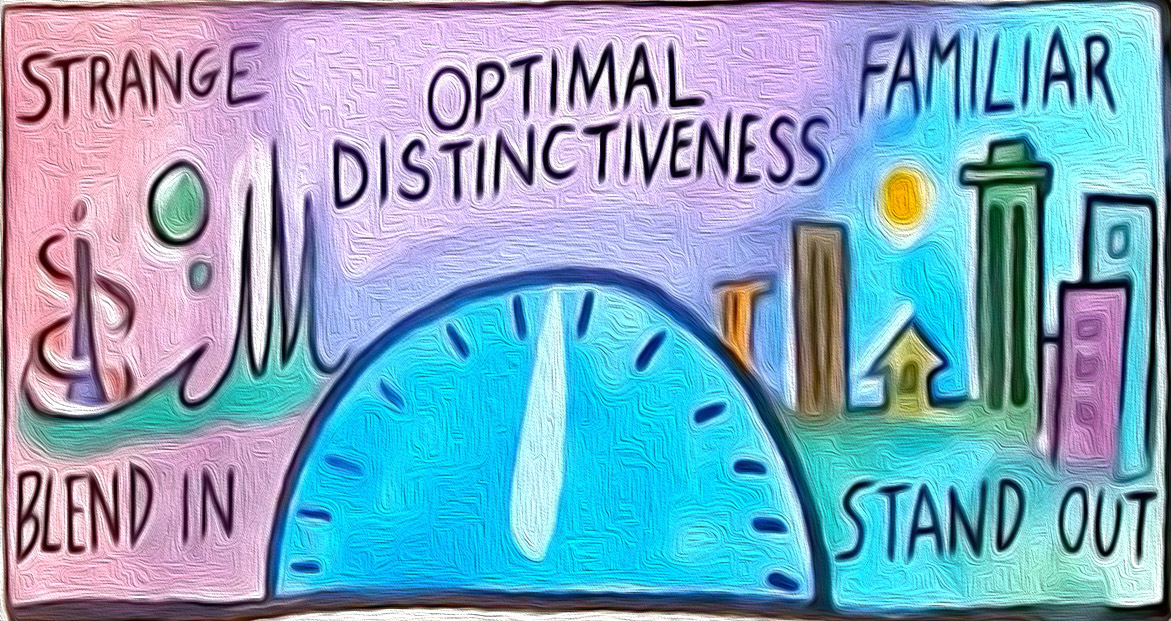Olga Khazan‘s book “Weird: The Power of Being an Outsider in an Insider World” explores the feeling of being different and how it affects people. She explains why people want to fit in and the challenges of being unique. Khazan also sheds light on the advantages of standing out and provides guidance for navigating a path to success despite societal norms. Here are some of the key ideas mentioned in the book:
Key Idea No. 1: You are Not Alone
In our journey through life, we often encounter moments when we feel like we don’t quite fit in. These feelings of being different or “weird” can arise from various sources, such as our background, appearance, or experiences of social exclusion. However, it’s crucial to recognize that these feelings are common and that many people have experienced them.

Feeling like an outsider can stem from being bullied in school or working in an environment where you feel like you don’t belong. While everyone’s struggles are unique, it’s essential to understand that being different isn’t a flaw – it’s a part of what makes you special. In fact, embracing your uniqueness can be your superpower.
Embracing our uniqueness isn’t always easy, especially when we live in a world that often values conformity over individuality. But it’s essential to stay true to ourselves and resist the pressure to change who we are to fit in. By embracing our differences, we not only honor our own identities but also contribute to a more diverse and inclusive society.
So, the next time you feel like you don’t quite fit in, remember this: being weird is a badge of honor, not a mark of shame. Embrace your uniqueness, celebrate what makes you different, and watch as your authenticity shines through. After all, the world would be a pretty dull place if we were all the same.
Key Idea No. 2: Social Norms Shape Human Behavior
The idea of “weirdness” or being considered a “weirdo” is deeply intertwined with the concept of social norms. Social norms are the silent architects of our behavior, influencing everything from the clothes we wear to the way we interact with others. These unwritten rules dictate what is considered acceptable or unacceptable within a particular society or group.

We’re wired to fit in. So, we tend to follow these unwritten rules of how to behave. If we don’t, people might think we’re weird or just ignore us. When someone does something that’s considered weird, it disrupts things. It makes others feel uneasy because it’s not what they’re accustomed to. And that feeling of unease usually stems from not understanding why someone is behaving differently.

But here’s the thing: what’s weird to you might not be weird to someone else. It’s all about where you’re from and what you’re used to. Like, something totally normal in one place could seem super odd somewhere else. So, these rules about what’s normal and what’s not, they’re not set in stone. They’re kind of flexible. This shows that social norms can change and we should question if they’re always right.
At the end of the day, social norms are a big deal. They control our actions, our choices, and we don’t even realize it most of the time. So, next time you feel like someone’s being weird, maybe take a moment to think about why. Maybe it’s not them, maybe it’s just our idea of what’s normal that needs a rethink.
Key Idea No. 3: Consequences of Being Weird
Loneliness and feeling left out hit everyone at some point, but it’s especially tough for those who feel like they don’t quite fit in – the ‘weird’ ones. Being ignored or excluded by peers can make you feel invisible, paranoid, and really frustrated. It’s like being punched in the gut, leaving a deep wound inside you. But what’s even scarier is how it messes with your head.
Imagine you’re part of a group. Now, if someone tells you that you’re totally different from everyone else in the group, you might start believing all the bad stuff people say about that group. It’s like you’re desperate to fit in, even if you don’t. Being left out hurts so bad that some people do really bad things to avoid it.

Some studies even say that things like terrorism come from feeling cut off from your group. It’s like you don’t know who you are anymore. You just want to belong somewhere, so you might follow someone who tells you what your group is all about. When you’re not sure about yourself, you’ll grab onto anything that feels steady. You might even join groups that aren’t so great just because they give you a new identity. But here’s the scary part: being left out can make you believe stuff you never thought before. You might not be a mean person, but when you’re lonely, you might start thinking mean things because of the people around you.
But loneliness isn’t just in your head – it messes with your body too. Chronic loneliness can mess up your physical health, making your immune system go haywire and causing inflammation. Over time, this inflammation can cause all sorts of health problems, like heart disease and dementia. So, feeling left out doesn’t just hurt your feelings, it can mess up your whole body. That’s why it’s so important to deal with it, before it deals with you.
Key Idea No. 4: Weirdness Sparks Creativity
In a world where everyone’s trying to fit in, being labeled as “weird” can be scary. From childhood to adulthood, society tends to teach us that being different is undesirable, often leading to feelings of isolation and self-doubt. However, embracing your weirdness could actually be a key to unlocking creativity?
There’s this theory called Optimal Distinctiveness Theory (ODT). It says people want to fit in with a group but also want to feel unique. It’s like finding a balance between being part of a team and being your own person. When you’re too similar to everyone else, you might feel like you’re losing yourself. But if you’re too different, you might feel left out. ODT suggests there’s a sweet spot where you feel both connected to the group and true to yourself. It is the reason why an indie band loses its attraction when it becomes mainstream, there’s a certain charm in being part of an exclusive group rather than a faceless crowd.

While not everyone views their weirdness as a strength, shifting one’s perspective can yield significant benefits. Research indicates that altering how we perceive our circumstances can enhance our ability to cope with challenges. Seeing our quirks and peculiarities as sources of power rather than liabilities can lead to greater happiness and fulfillment.
Creativity often thrives in environments of rejection or uncertainty. Studies have shown that individuals who embrace their uniqueness tend to exhibit higher levels of creativity, especially when faced with adversity. Rejection can serve as a catalyst for unlocking new ideas and perspectives, prompting individuals to explore unconventional paths.

Furthermore, embracing diverse cultural perspectives can significantly enhance creativity. Bicultural individuals who seamlessly blend their cultural identities often exhibit heightened creative abilities. Similarly, groups that welcome unorthodox voices and nonconformist viewpoints tend to generate more innovative ideas. By fostering diversity of thought and encouraging critical thinking, these groups pave the way for groundbreaking discoveries and solutions.
In essence, being weird isn’t just about deviating from the norm; it’s about celebrating individuality and embracing diversity. Contrary to societal norms, weirdness can be a catalyst for creativity, innovation, and personal growth. By recognizing and nurturing our unique qualities, we unlock the potential for greater happiness, fulfillment, and success.
So, the next time you feel like you don’t quite fit in, remember that your weirdness is not a flaw to be corrected but a strength to be celebrated. Embrace your uniqueness, dare to be different, and watch as creativity flourishes in the most unexpected ways. After all, in a world where conformity is commonplace, it’s the weird ones who change it for the better.
Key Idea No. 5: Weirdness Empowerment Tips
If you’re someone who feels a bit different from the crowd, you have some options to consider. You can choose to stay where you are, move to a place where you feel more comfortable, or find a middle ground by being part of two communities. Most weird people find the middle option best, even though it can be uncomfortable not fitting in completely. Here are some simple tips to help you feel more comfortable with your uniqueness.
- Find Your Tribe: As a weird person, finding your tribe is crucial. Surround yourself with individuals who not only accept your quirks but celebrate them. Seek out communities where your weirdness is not only tolerated but embraced. Whether it is online forums, local meetups, or niche interest groups, cultivating a supportive network of like-minded individuals can provide a sense of belonging and validation like no other.
- Embrace Resilience: Life is full of challenges, especially for those who dare to be different. Embrace resilience as your secret weapon against adversity. Instead of viewing setbacks as roadblocks, see them as opportunities for growth and learning. Remember that your weirdness is what sets you apart and gives you the strength to overcome any obstacle that comes your way.
- Be Authentic: In a world that often pressures us to conform, staying true to yourself can be a radical act of defiance. Trust your instincts and stand by your decisions, even if they go against societal norms. Your authenticity is your greatest asset, so don’t be afraid to let your weirdness shine bright for all to see.
- Be Supportive: Just as you receive support from your community, pay it forward by offering a helping hand to others who may be struggling with their own weirdness. Your unique perspective and experiences can provide valuable insights and encouragement to those in need. Remember, we’re all in this together, and lifting each other up is the key to collective empowerment.
- Challenge Impostor Syndrome: Weirdos often feel imposter syndrome due to societal norms and their unconventional approaches. They may fear being exposed as fraudulent, especially when they achieve success. Their unique perspectives can clash with traditional standards, amplifying feelings of inadequacy. Overcoming imposter syndrome for them involves challenging negative thoughts and embracing their quirks, recognizing the value they bring through their unconventional ideas.
In a world where conformity often seems like the norm, “Weird: The Power of Being an Outsider in an Insider World” celebrates the beauty of diversity and individuality. It reminds us that there is no standard for normalcy and that embracing our uniqueness can be liberating. This insightful book pays homage to those who defy convention, offering a balanced perspective on the power of being an outsider.

Leave a Reply